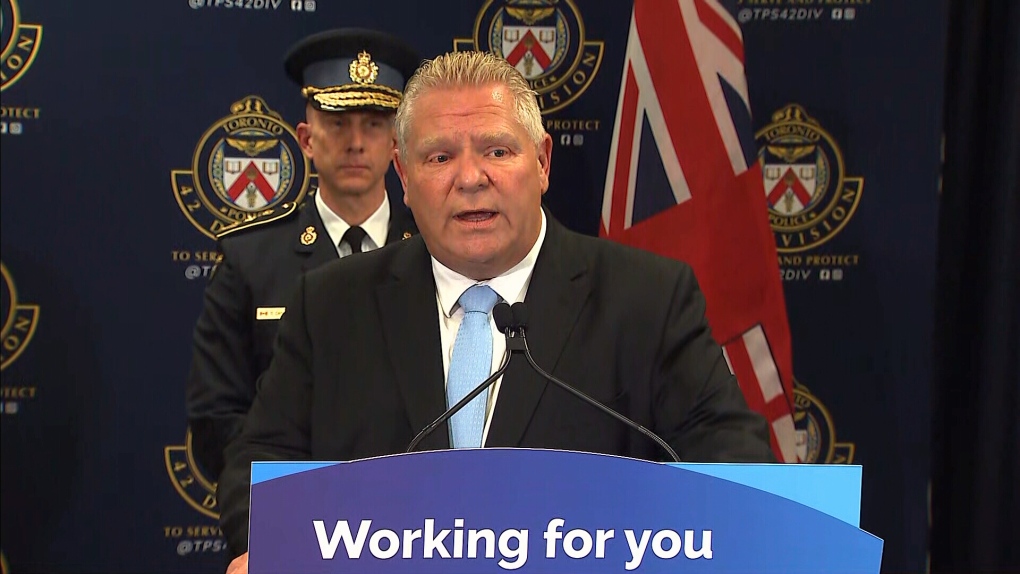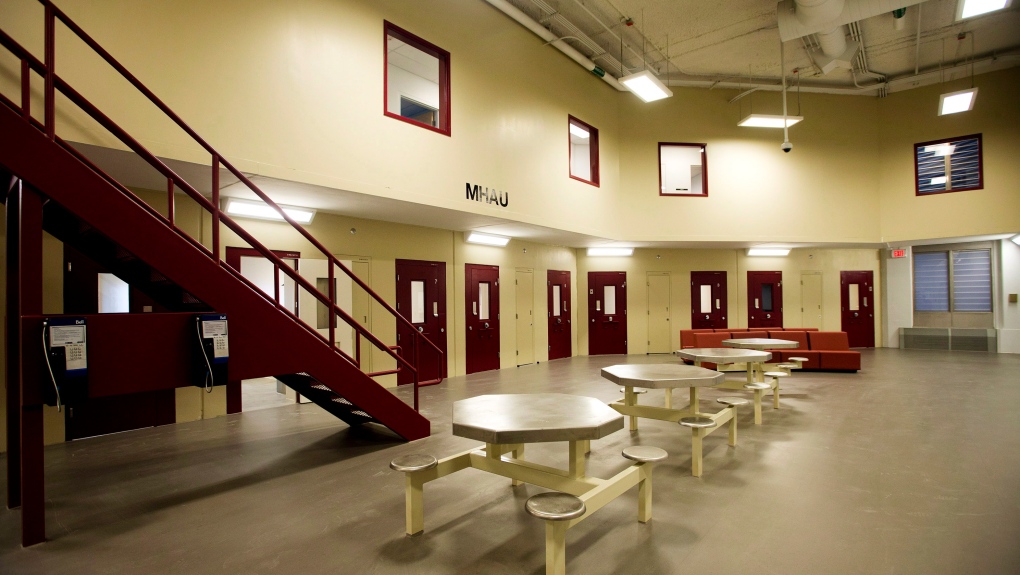More than 80% of inmates in Ontario jails last year were legally innocent, awaiting trial: data
A vast majority of the people incarcerated in Ontario jails last year were awaiting a trial, according to provincial records obtained by CTV News Toronto.
The data, obtained by a Freedom of Information request, shows that of the average 9,000 people in custody in Ontario on any given day last year, 82 per cent were in pre-trial detention, while 15 per cent had been sentenced.
- Download our app to get local alerts on your device
- Get the latest local updates right to your inbox
The remaining three per cent were in custody for “other” reasons, such as immigration detentions, police lockups, or federally-sentenced offenders.
“We have more people in our provincial jails who are supposed to be considered legally innocent than who have been convicted or found guilty and sentenced to be there,” Nicole Myers, an associate professor of criminology at Queen’s University, said Monday. “It should be absolutely alarming, but also it's entirely predictable and that’s because this has become an entrenched problem, spanning almost 20 years now.”
The new data comes just weeks after new federal legislation implementing stricter bail measures came into effect and less than a year after Premier Doug Ford allocated more than $100 million to Crown prosecutors and police services to fix Ontario's "broken" bail system.
While the Ford government says the investment has bolstered public security, experts say there is no evidence that stricter bail measures have a clear correlation to safety and that harsh conditions in provincial jails stand to inflict suffering on the legally innocent, if bail is denied.
When reached for comment on the 2023 figures, the Ministry of the Solicitor General, which oversees the provincial prison system, did not respond before publication.
Recent changes to Ontario's bail system
On Jan. 4, the most recent amendments to Canada’s bail reform came into effect.
The changes, first introduced by the Liberal government in May 2023, expanded the use of reverse-onus provisions. Instead of prosecutors having to prove why the accused should remain in custody, the onus has shifted to the accused to prove why they should be released.
The bill landed amid increased anxiety over public safety in the wake of the fatal shooting of Ontario Provincial Police Const. Greg Pierzchala in December 2022. A month after the incident, a letter that originated in Ontario Premier Doug Ford’s office, penned alongside several premiers, urged the federal government to take “swift action” on the bail system, citing the growing number of calls for reform that followed Pierzchala’s death.
That spring, the Ford government also announced it would spend $112 million on measures meant to “fix Ontario’s broken bail system,” including the introduction of specialized prosecution in court hearings and police compliance teams.
“We're seeing too many innocent people lose their lives to dangerous offenders," Ford said at an announcement on the new funding. "We're making sure the most dangerous criminals are locked up behind bars and not creating havoc on our streets.”
 Ont. invests $112M in bail reform
Ont. invests $112M in bail reform
When reached for comment, the Ministry of the Attorney General, which oversees Ontario's court system, told CTV News Toronto that the more than $100-million investment prioritizes public safety and security.
"This funding will help police apprehend high-risk violent offenders wanted for breaching bail and community supervision order conditions and support prosecutors and courts when dealing with bail hearings for repeat offenders involved with serious violent crimes," it said.
The changes, however, were met with pushback by advocates such as the Canadian Civil Liberties Foundation (CCLA) and The Canadian Association of Elizabeth Fry Societies, both of which argued the amendments were harmful to the rights of the accused and would not improve public safety. Some who work in the criminal justice system say the new measures, now well in effect, have overly complicated the bail hearing process and created an imbalance in the courtroom.
“It’s gone totally off the rails,” Toronto defence lawyer Alison Craig told CTV News in an interview Sunday. “[Hearings] used to be a couple of hours, now I’m booking them sometimes for one or two days."
“These teams are filing dozens or hundreds of pages [of submissions], they’re turning it into the trial,’ Craig said. “I’ve had clients cross-examined for two, three hours. It’s become a character assassination and that’s not what bail is supposed to be about. It’s simply to assess risk.”
Conditions in Ontario jails
An accused denied bail and remanded into a provincial jail or detention centre is often "subjected to the worst aspects of our correctional system by being detained in dilapidated, overcrowded cells without access to recreational or educational programs," according to the Supreme Court of Canada.
A report released last January by the Chief Coroner put forth a number of recommendations after it found that inmates in Ontario’s jails were dying at “an alarming rate.”
In recent weeks, in at least one provincial detention centre in Toronto, conditions have gotten so bad that sentences for some offenders are being shortened. In the last year, records show at least 24 inmates had their sentences reduced because of repeated lockdowns, pest infestations, and other harsh treatment at the Toronto South Detention Centre.
According to Craig and Myers, the conditions mean that legally innocent inmates are often subject to some of the strictest measures.
“The condition of our remand jails at the moment is just terrible,” Craig said, “We on the outside may have sort of recovered from COVID-19, but they have not. They're locked down in their cells for days or weeks on end with no access even to the phone to call their lawyers.”
Although time served pre-trial counts as credit towards a sentence, that time is spent in a setting that does not offer the same kind of programming one might find in a federal facility.
“When we're looking at provincial custody, we don't see the kinds of availability of programming, rehabilitative or educational, because people are there generally for a very short time and often for an unknown period of time,” Myers said.
“You end with this problem that people often refer to as ‘dead time’ – they're simply sitting there waiting for their matters to be resolved, without any real productive purpose.”
 The special care medical inmate facility is shown during a media tour of the Toronto South Detention Centre in Toronto on Thursday, Oct. 3, 2013. The facility is slated to open this fall. THE CANADIAN PRESS/Nathan Denette
The special care medical inmate facility is shown during a media tour of the Toronto South Detention Centre in Toronto on Thursday, Oct. 3, 2013. The facility is slated to open this fall. THE CANADIAN PRESS/Nathan Denette
What about public safety?
While the number of people remanded into pre-trial detention has skyrocketed over the years in Canada, advocates like Myers and Shakir Rahim, director of the criminal justice program at the CCLA, say there has been no clear corresponding decrease in overall crime.
“Time spent in custody is criminogenic -- it makes people more, not less, likely to commit further offenses,” she said. “If anything, creating a more restrictive bail system will make us less safe."
Rahim, who spearheaded the CCLA's successful amendment to Bill C48, echoed Myers' sentiments. “If it was just a simple connection between less bail and more public safety, then the data suggests we should be living in a Nirvana right now as Canada has significantly reduced access to bail.”
“We at CCLA, like others, we care about public safety,” Rahim said."We just want to think about what we can do within our bail system to have it run effectively.”
When asked what meaningful bail reform would look like, Rahim pointed to community-based programs that help the accused meet their conditions successfully.
“These evidence-based programs supervise and support people on bail, but no money is being directed to them and that's one of the central problems.”
The Bail Program, run by the John Howard Society, is one such example. The program offers beds to those with no fixed address who have been released on bail, ensuring they can meet their conditions by returning to a set location each night.
CTVNews.ca Top Stories

Back on air: John Vennavally-Rao on reclaiming his career while living with cancer
'In February, there was a time when I thought my career as a TV reporter was over,' CTV News reporter and anchor John Vennavally-Rao writes.
The winter solstice is here, the Northern Hemisphere's darkest day
The winter solstice is Saturday, bringing the shortest day and longest night of the year to the Northern Hemisphere — ideal conditions for holiday lights and warm blankets.
Poilievre writes to GG calling for House recall, confidence vote after Singh declares he's ready to bring Liberals down
Conservative Leader Pierre Poilievre has written to Gov. Gen. Mary Simon, imploring her to 'use your authority to inform the prime minister that he must' recall the House of Commons so a non-confidence vote can be held. This move comes in light of NDP Leader Jagmeet Singh publishing a letter stating his caucus 'will vote to bring this government down' sometime in 2025.
School custodian stages surprise for Kitchener, Ont. students ahead of holiday break
He’s no Elf on the Shelf, but maybe closer to Ward of the Board.
Kelly Clarkson's subtle yet satisfying message to anyone single this Christmas
The singer and daytime-talk show host released a fireside video to accompany her 2021 holiday album, “When Christmas Comes Around” that she dubbed, “When Christmas Comes Around…Again.
Judge sentences Quebecer convicted of triple murder who shows 'no remorse'
A Quebecer convicted in a triple murder on Montreal's South Shore has been sentenced to life in prison without chance of parole for 20 years in the second-degree death of Synthia Bussieres.
At least 2 dead, 60 hurt after car drives into German Christmas market in suspected attack
A car plowed into a busy outdoor Christmas market in the eastern German city of Magdeburg on Friday, killing at least two people and injuring at least 60 others in what authorities suspect was an attack.
16-year-old German exchange student dies after North Vancouver crash
A 16-year-old high school student from Germany who was hit by a Jeep in North Vancouver, B.C., last weekend has died in hospital, authorities confirmed.
Poilievre to Trump: 'Canada will never be the 51st state'
Conservative leader Pierre Poilievre is responding to U.S. president-elect Donald Trump’s ongoing suggestions that Canada become the 51st state, saying it will 'never happen.'


































